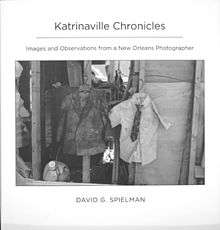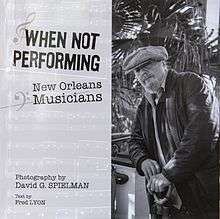David Spielman

David G. Spielman (born 1950) is an American freelance photographer.
Early life
Spielman was born in Tulsa, Oklahoma and graduated from Tulsa Central High School. He then attended and graduated from Westminster College, Fulton, Missouri.
Spielman’s interest in photography began at the age of 15.[1] When he looked through a camera, his blood pressure dropped and pulse slowed, he knew at the instant he wanted to be a photographer. While Spielman was attending Westminster College, a bombed out Christopher Wren Church from London was transported to Fulton and reconstructed on Westminster’s campus. Honoring Winston Churchill’s visit and speech in which he coined the phrase “iron curtain.”[2] Most of Spielman’s senior was spent in Vienna and traveling Europe studying art history. He credits this experience as a turning point helping him understand and appreciate composition and design.[1]
Photography career

After graduation Spielman moved south to New Orleans to start his photographic career. He has never been employed as a staffer or photographer of record. Always a freelancer! With projects around the world, he work has taken him to France, England, Ireland, Russia, Egypt, Pakistan, Singapore, Hong Kong, Central America and other locations. From world leaders, corporate reports and personal projects his traveling has been constant and extensive.[3] His images have appeared in numerous magazines and newspapers, including The Times, New York Times, Los Angeles Times, Time Magazine, Newsweek, Forbes, and Architectural Digest.[4]
Spielman's work has been featured in five books:
Southern Writers,[5] has 72 portraits of Southern authors; including Eudora Welty, Pat Conroy, Richard Ford, James Dickey, Ernest Gaines, Shelby Foote, Anne Rice and many others. Working quickly Spielman usually shoots in a comfortable and relaxed location insuring a pleasant and revealing portrait.[6]
New Orleans Musicians: When Not Performing,[7] is a collection of portraits of 71 musicians when not on stage. Each was asked where they wanted to be photographed, which offers the viewer a glimpse into their lives. The book includes Dr. John, Pete Fountain, Harry Connick, Frogman Henry, Fats Domino, Irma Thomas, Allen Toussaint and more. As he did in his Southern Writers book Spielman works quickly, usually one on one, as he feels more people there causes distractions for the subject. Therefore allowing an intimate and personal exchange between the subject and photographer.

Katrinaville Chronicles[8] is Spielman's start to a long-term photographic essay about Hurricane Katrina and its aftermath. Not being a “hard news” guy, his approach was that of an observer trying to document what happened to his city, New Orleans. Working slowly and very deliberately he traversed the city searching for images that would tell a story. Spielman always attempts to render the best possible image leaving his biases out of the way. This book also includes his e-mails to family and friends. Never thinking that his words and observations would be part of a book. It was just his first person account of what he was seeing and feeling after the storm when the city was almost void of people. He modeled his work after that of the wonderful photographers who documented the Great Depression and Dust Bowl. This was his WPA; the only difference was there was no government funding, no editors to help tell them where to go. He was on his own, shooting and funding his work without any outside help.
The Katrina Decade[9] is a book and major exhibition with the Historic New Orleans Collection, documenting the ten years after Hurricane Katrina. Spielman continued to photograph New Orleans post storm, documenting areas and neighborhoods that may be missed by someone less familiar with New Orleans. With lots of rebuilding taking place, the recovery didn’t reach and include everyone and every place. The book shows houses completely vine covered and structures stripped of any and all valuable architectural details. A melancholy beauty with a haunting air overtook many parts of the city. The Historic New Orleans Collected hosted a major 10th anniversary show of Spielman’s Katrina work.[10]
Gallery and museum showcases
Spielman’s work continues to be collected through out the U.S., Europe and Asia. The Historic New Orleans Collection and the Ogden Museum of the South both have many of his images in their permanent collections. He also continues to give lectures, talks and workshops about all of his work. Spielman maintains a gallery in the historic Garden District, where his photos can be viewed year around. Tours of the Garden District depart everyday at 10 A.M.
Publications
- The Katrina Decade: Images of an Altered City published by the Historic New Orleans Collection 2015
- New Orleans Musicians: When Not Performing published by Pelican Publishing Company 2012
- Katrinaville Chronicles, published by LSU Press 2007
- Arnaud's Restaurant Cookbook published by Pelican Publishing Company 2005
- Dickie Brennan's Palace Café Cook Book, published 2002
- Southern Writers, published b2y South Carolina Press 1997
Footnotes
- 1 2 Tulsa World News. "Katrinavilla Chronicles" June 28, 2006
- ↑ Modern History Sourcebook: "Winston Churchill: The Iron Curtain"
- ↑ The Times Picayune, New Orleans, Living Section. November 19, 2003
- ↑ http://search.barnesandnoble.com/Katrinaville-Chronicles/David-G-Spielman/e/9780807132524/?itm=1
- ↑ ISBN 1-57003-224-6
- ↑ http://www.experiencejefferson.com/documents/PRESSRELEASE-DavidSpielman061307.pdf
- ↑ Lyon, Fred; Spielman, David (2012-10-10). When Not Performing. Gretna, La.: Pelican Publishing. ISBN 9781455617562.
- ↑ ISBN 978-0-8071-3252-4
- ↑ "The Katrina Decade: Images of an Altered City". www.hnoc.org. Retrieved 2016-08-02.
- ↑ "THNOC » The Katrina Decade: Images of an Altered City". www.hnoc.org. Retrieved 2016-08-02.
External links
- Website: DavidSpielman.com
- Website: gardendistrictwalksnola.com